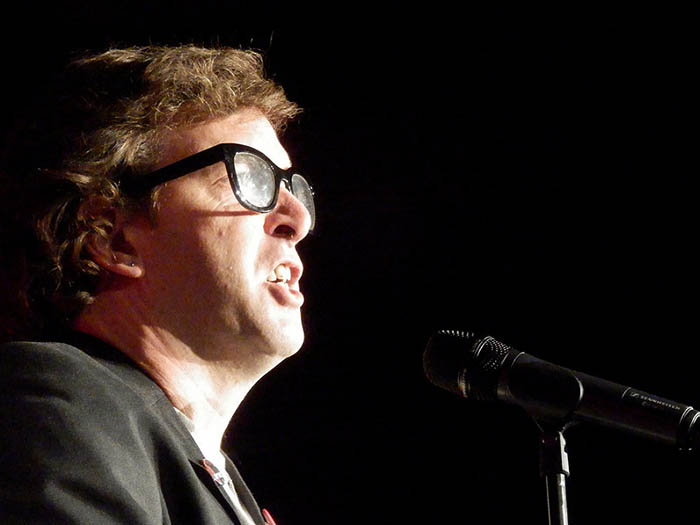26 Oct 17 | Mapping Media Freedom, media freedom featured, News and features
[vc_row][vc_column][vc_column_text]
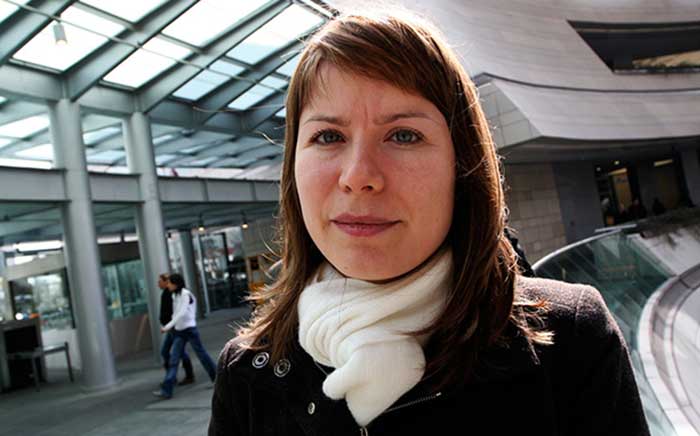
Wall Street Journal reporter Ayla Albayrak
Last week, a reporter for the Wall Street Journal was convicted of producing “terrorist propaganda” in Turkey and sentenced to more than two years in prison.
Ayla Albayrak was charged over an August 2015 article in the newspaper, which detailed government efforts to quell unrest among the nation’s Kurdish separatists, “firing tear gas and live rounds in a bid to reassert control of several neighborhoods”.
Albayrak was in New York at the time the ruling was announced and was sentenced in absentia but her conviction forms part of a growing pattern of arrests, detentions, trials and convictions for journalists under national security laws – not just in Turkey, the world’s top jailer of journalists, but globally.
As security – rather than the protection of fundamental rights and freedoms – becomes the number one priority of governments worldwide, broadly-written security laws have been twisted to silence journalists.
It’s seen starkly in the data Index on Censorship records for a project monitoring media freedom in Europe: type the word “terror” into the search box of Mapping Media Freedom and more than 200 cases appear related to journalists targeted for their work under terror laws.
This includes everything from alleged public order offences in Catalonia to the “harming of national interests in Ukraine” to the hundreds of journalists jailed in Turkey following the failed coup.
This abusive phenomenon started small, as in the case of Turkey, with dismissive official rhetoric that was aimed at small segments — like Kurdish journalists — among the country’s press corps, but over time it expanded to extinguish whole newspapers or television networks that espouse critical viewpoints on government policy.
While Turkey has been an especially egregious example of the cynical and political exploitation of terror offenses, the trend toward criminalisation of journalism that makes governments uncomfortable is spreading.

Mónica Terribas, journalist for Catalunya Rádio
In Spain, the Spanish police association filed a lawsuit against Mónica Terribas, a journalist for Catalunya Rádio, accusing her of “favouring actions against public order for calling on citizens in the Catalonia region to report on police movements during the referendum on independence.
The association said information on police movements could help terrorists, drug dealers and other criminals.
Undermining state security is a growing refrain among countries seeking to clamp down on a disobedient media, particularly in countries like Russia. In December 2016, State Duma Deputy Vitaly Milonov urged Russia’s Prosecutor General to investigate independent Latvia-based media outlet Meduza’s on charges of “promoting extremism and terrorism” for an article published the day before.
The piece written by Ilya Azar entitled, When You Return, We Will Kill You, documents Chechens who are leaving continental Europe through Belarussian-Polish border and living in a rail station in Brest, a border city in Belarus. Deputy Milonov said he considers the article a provocation aimed at undermining unity of Russia and praising terrorists.
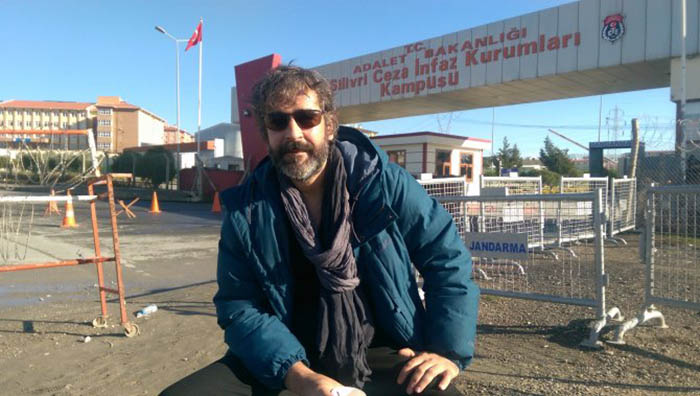
German journalist Deniz Yucel
In Turkey, reporting deemed critical of the government, the president or their associates is being equated with terrorism as seen in the case of German journalist Deniz Yucel who was detained in February this year.
Yucel, a dual Turkish-German national was working as a correspondent for the German newspaper Die Welt. He was arrested on charges of propaganda in support of a terrorist organization as well as inciting violence to the public and is currently awaiting trial, something that could take up to five years.
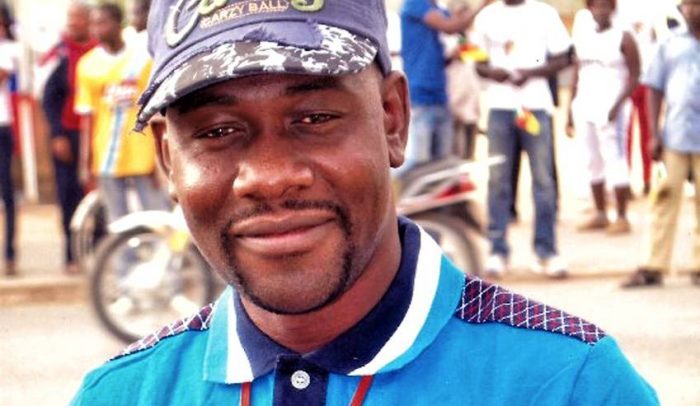
Ahmed Abba
Outside of the European region, journalists regularly fall foul of national security laws. In April, journalist Ahmed Abba was sentenced to 10 years behind bars by a military tribunal in Cameroon after being convicted of non-denunciation of terrorism and laundering of the proceeds of terrorist acts. Accompanying the decade-long sentence was a fine of over $90,000 dollars. Abba, a journalist for Radio France International, was detained in July of 2015. He was tortured and held in solitary confinement for three months.
The military court allegedly possessed evidence against Abba, who was barred from speaking with the media during his trial, which they found on his computer. Among the alleged evidence was contact information between Abba and the Islamist terrorist group Boko Haram. Abba, who was in the area to report on the Boko Haram conflict, claimed he obtained the information that was discovered on his phone from various social media outlets with the intent of using them for his report.
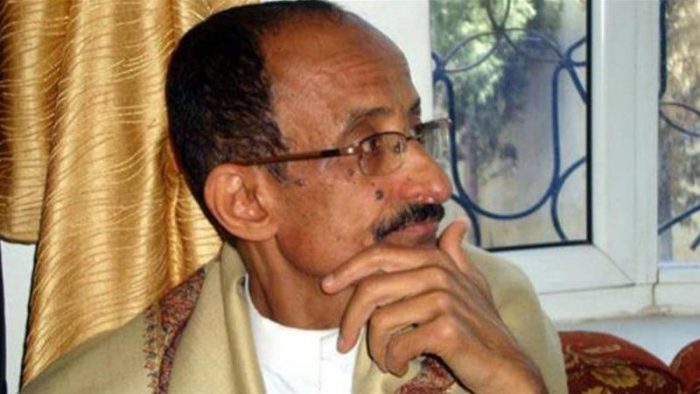
Yemeni journalist Yahya Abduraqeeb al-Jubaihi
Yemeni journalist Yahya Abduraqeeb Al-Jubaihi was sentenced to death earlier this month for allegedly serving as an undercover spy for Saudi Arabian coalition forces. Al-Jubaihi, who has worked as a journalist for various Yemeni and Saudi Arabian newspapers, has been held in a political prison camp ever since he was abducted from his home in September 2016.
Al-Jubaihi is the first journalist to be sentenced to death in Yemen following a trial that many activists believe was politically motivated because of Al-Jubaihi’s columns criticising Houthis.
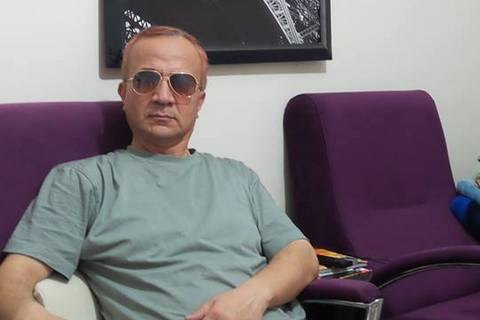
Journalist Narzullo Akhunjonov
Increasingly, governments are turning to Interpol to target journalists under terror laws. Turkey has filed an application to seek an Interpol arrest warrant for Can Dündar, demanding the journalist’s extradition. In September, Uzbek journalist Narzullo Okhunjonov was detained by authorities in Ukraine following an Interpol red notice.
Uzbek authorities have issued an international arrest warrant on fraud charges against Okhunjonov, who had been living in exile in Turkey since 2013 in order to avoid politically motivated persecution for his reporting.
And governments are also using terror laws to spy on journalists. In 2014, the UK police admitted it used powers under terror legislation to obtain the phone records of Tom Newton Dunn, editor of The Sun newspaper, to investigate the source of a leak in a political scandal. Police powers under the Regulation of Investigatory Powers Act, which circumvents another law that requires police to have approval from a judge to get disclosure of journalistic material.
No laughing matter

The Sun editor Tom Newton Dunn
Even jokes can land journalists in trouble under terror laws. Last year, French police searched the office of community Radio Canut in Lyon and seized the recording of a radio programme, after two presenters were accused of “incitement to terrorism”.
Presenters had been talking about the protests by police officers that had recently been taking place in France. One presenter said: “This is a call to people who people who killed themselves or are feeling suicidal and to all kamikazes” and to “blow themselves up in the middle of the crowd”.
One of the presenters was put under judicial supervision and was forbidden to host the radio programme until he appeared in court.
Radio Canut journalist Olivier Combi explained that the comment was ironic: “Obviously, Radio Canut is not calling for the murder of police officers, as it was sometimes said in the press”, he said. “Things have to be put back in context: the words in question are a 30 seconds joke-like exchange between two voluntary radio hosts…Nothing serious, but no media outlet took the trouble to call us, they all used the version of the police.”
Fighting back to protect sources
Two Russian journalists — Oleg Kashin and Alexander Plushev — are pushing back, Meduza reported. Kashin and Plushev filed the lawsuit challenging Russia’s Federal Security Service’s demands that instant messaging apps turn over encryption keys for users’ private communications, which is being driven by Russia’s anti-terror legislation. The court rejected the suit with the judge reportedly found that the government’s demands do not infringe on Plushev’s civil rights.
The journalists had contended that the FSB’s demand violated their right to confidential conversations with sources. Kashin said that in his work as a journalist he had come to rely on apps such as Telegram to conduct interviews with politicians.
Human rights organisation Agora is representing Telegram in a separate case against the FSB, which has fined the app company for failing to comply with its demands.[/vc_column_text][vc_row_inner][vc_column_inner width=”1/2″][vc_single_image image=”96229″ img_size=”full” onclick=”custom_link” link=”https://www.indexoncensorship.org/newsite02may/2017/10/turkish-injustice-scores-journalists-rights-defenders-go-trial/”][/vc_column_inner][vc_column_inner width=”1/2″][vc_column_text]
About 90 journalists, writers and human rights defenders will appear before courts in the coming days[/vc_column_text][/vc_column_inner][/vc_row_inner][vc_row_inner][vc_column_inner width=”1/2″][vc_single_image image=”96183″ img_size=”full” onclick=”custom_link” link=”https://www.indexoncensorship.org/newsite02may/2017/10/interpol-the-abuse-red-notices-is-bad-news-for-critical-journalists/”][/vc_column_inner][vc_column_inner width=”1/2″][vc_column_text]
Since August, at least six journalists have been targeted across Europe by international arrest warrants issued by Turkey, Azerbaijan, Uzbekistan and Kazakhstan[/vc_column_text][/vc_column_inner][/vc_row_inner][/vc_column][/vc_row][vc_row][vc_column][vc_custom_heading text=”Mapping Media Freedom” use_theme_fonts=”yes”][vc_separator color=”black”][vc_row_inner][vc_column_inner width=”1/4″][vc_icon icon_fontawesome=”fa fa-times-circle” color=”black” background_style=”rounded” size=”xl” align=”right”][/vc_column_inner][vc_column_inner width=”3/4″][vc_column_text]
Since 24 May 2014, Mapping Media Freedom’s team of correspondents and partners have recorded and verified 3,597 violations against journalists and media outlets.
Index campaigns to protect journalists and media freedom. You can help us by submitting reports to Mapping Media Freedom.[/vc_column_text][/vc_column_inner][/vc_row_inner][/vc_column][/vc_row][vc_row][vc_column][vc_custom_heading text=”Don’t lose your voice. Stay informed.” use_theme_fonts=”yes”][vc_separator color=”black”][vc_row_inner][vc_column_inner width=”1/2″][vc_column_text]Index on Censorship is a nonprofit that campaigns for and defends free expression worldwide. We publish work by censored writers and artists, promote debate, and monitor threats to free speech. We believe that everyone should be free to express themselves without fear of harm or persecution – no matter what their views.
Join our mailing list (or follow us on Twitter or Facebook) and we’ll send you our weekly newsletter about our activities defending free speech. We won’t share your personal information with anyone outside Index.[/vc_column_text][/vc_column_inner][vc_column_inner width=”1/2″][gravityform id=”20″ title=”false” description=”false” ajax=”false”][/vc_column_inner][/vc_row_inner][vc_separator color=”black”][/vc_column][/vc_row]
25 Oct 17 | Events
[vc_row][vc_column][vc_single_image image=”96247″ img_size=”full” alignment=”center”][vc_column_text]Join us to mark the International Day to End Impunity for Crimes Against Journalists by joining a vigil mourning the death of Maltese investigative journalist Daphne Caruana Galizia, who was murdered on Monday 16 October.
Daphne Caruana Galizia was a Maltese journalist and blogger known for her investigative reporting on controversial and sensitive information.
Fifteen days after filing a police report that she was being threatened, Caruana Galizia was killed when the car she was driving exploded.
“We strongly condemn the violent killing of investigative journalist Daphne Caruana Galizia. We urge the Maltese authorities to swiftly and thoroughly investigate the circumstances to bring the perpetrators to justice,” Hannah Machlin, project manager of Mapping Media Freedom, said.[/vc_column_text][/vc_column][/vc_row][vc_row][vc_column][vc_column_text]
When: Thursday 2 November 1-2pm
Where: Malta High Commission, Malta House, 36-38 Piccadilly, Mayfair, London W1J 0LE (Map)
[/vc_column_text][/vc_column][/vc_row]
25 Oct 17 | Mapping Media Freedom, Media Freedom, News and features, Turkey, Turkey Uncensored
[vc_row][vc_column][vc_column_text]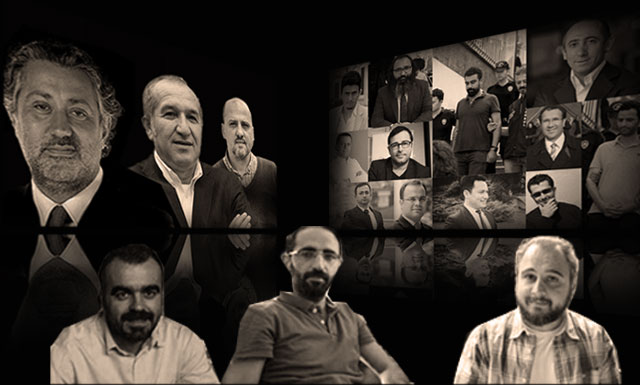
This article was originally posted at platform24.org.
Journalists, writers and human rights defenders will appear before judges in several court hearings scheduled for the coming days.
P24 will be following the upcoming hearings from the courtrooms and live tweeting the developments. Here is a list of the upcoming hearings:
Oct. 24: First court hearing for journalists in e-mail leak case
Six journalists, three of whom have been imprisoned since late December, will have their first day in court on October 24.
Former Diken news portal editor Tunca Öğreten, news editor of the shuttered DİHA news agency Ömer Çelik and BirGün employee Mahir Kanaat, DİHA reporter Metin Yoksu, ETHA news agency Responsible Managing Editor Derya Okatan and Yolculuk daily publisher Eray Sargın were first arrested on December 25 in police raids in an investigation into publication of leaked e-mails of Berat Albayrak, Turkey’s energy minister. After a record 24 days in police custody, a criminal judgeship of peace ordered Çelik, Tunca and Kanaat jailed pending trial while releasing Okatan, Sargın and Yoksu, with a travel ban.
The journalists face terrorism related charges as well as the charge of “disrupting or preventing an IT system, amending or destroying data.”
The hearing will take place at the Istanbul 29th High Criminal Court at Istanbul’s Çağlayan Courthouse.
Oct. 24: Murat Aksoy, Atilla Taş and others
The next hearing of a case where journalist Murat Aksoy, ex-singer and a columnist for the shuttered Meydan daily Atilla Taş, Türk Solu journal writer Gökçe Fırat Çulhaoğlu and 26 others face coup and terrorism charges will be held on the same day at the Istanbul 25th High Criminal Court.
Almost all of the defendants in the case are journalists from a variety of media outlets, some of which were closed down under the state of emergency. 23 of the 29 defendants are imprisoned awaiting further trial
The first hearing of the case where all of the 29 defendants face terrorism charges took place on March 27-31, at the end of which the court ruled to release 21 of the 26 defendants in pre-trial detention. But none was released after 13 defendants whose release was sought by the prosecutor were arrested as part of a new investigation – this time on coup charges – and eight others were detained upon a successful appeal from the prosecutor against their release. One of the 13 defendants who were arrested as part of the new coup investigation, Zaman editor Ali Akkuş, was released shortly after his arrest.
Two other journalists charged with coup, Bünyamin Köseli of Aksiyon weekly and Cihan Acar of Bugün newspaper, were released at the end of the first hearing on August 18.
The court also ruled to merge the coup trial with the earlier terrorism trial. The hearing on October 24 is the first session to take place after the two cases were merged.
Oct. 25: Human rights activists to appear in court
The ten human rights activists who were detained at a workshop on Istanbul’s Büyükada island in July will appear before a court for the first time on October 25.
Eight of the human rights defenders are still imprisoned. They will be tried along with Taner Kılıç, head of Amnesty International Turkey, who was detained earlier in another investigation.
The hearing will begin at 10 a.m. at the Çağlayan Courthouse. The Istanbul 35th High Criminal Court will hear the trial, but the session will take place in the courtroom for the Istanbul 14th High Criminal Court.
The rights activists face up to 10 years in jail on charges of “helping an armed organization” while Kılıç faces up to 15 years for “membership in the FETÖ terrorist organization.”
Idil Eser, the Director of Amnesty Turkey; İlknur Üstün from the Women’s Coalition; Günal Kurşun from the Human Rights Agenda Association;Nalan Erkem from Citizens’ Assembly; Özlem Dalkıran, also from Citizens’ Assembly; Veli Acu, from Human Rights Agenda Association; Şeyhmus Özbekli, lawyer Nejat Taştan; Association for Monitoring Equal Rights digital strategy consultant Ali Gharavi; and trainer and writer Peter Steudtner were detained on July 5. Taştan and Özbekli were later released on probation.
Oct. 25: Case into publication of MGK documents
October 25 is also the date for the next hearing of a case where former Taraf journalist Mehmet Baransu, who has been imprisoned since March 2015, and the former responsible managing editor of the shuttered daily, Murat Şevki Çoban are on trial on charges of acquiring and publishing state secrets in relation with a news story that claimed the Fethullah Gülen network was blacklisted by the country’s top security body at a National Security Council (MGK) meeting in 2004.
Baransu faces up to 50 years and six months while Çoban faces up to 31 years in prison.
The session will be heard by the Istanbul Anadolu 10th High Criminal Court.[/vc_column_text][/vc_column][/vc_row][vc_row][vc_column][vc_row_inner][vc_column_inner width=”1/4″][vc_icon icon_fontawesome=”fa fa-times-circle” color=”black” background_style=”rounded” size=”xl” align=”right”][/vc_column_inner][vc_column_inner width=”3/4″][vc_column_text]
Since 24 May 2014, Mapping Media Freedom’s team of correspondents have recorded and verified 3,597 violations against journalists and media outlets.
Index campaigns to protect journalists and media freedom. You can help us by submitting reports to Mapping Media Freedom.[/vc_column_text][/vc_column_inner][/vc_row_inner][/vc_column][/vc_row][vc_row][vc_column][vc_column_text]Oct. 26: Özgür Gündem solidarity case
On October 26, 13 journalists and writers will appear before judges at the Istanbul 14th High Criminal Court in a case where they face terrorism related charges due to their role in a campaign of solidarity with the Özgür Gündem daily, which was later shuttered.
Journalists İhsan Çaralan, Fehim Işık, Ertuğrul Mavioğlu, Celal Başlangıç, Celalettin Can, Öncü Akgül, Hüseyin Aykol, Ömer Ağın, Dilşah Kocakaya, Mehmet Şirin Taşdemir, Veysel Kemer and Yüksel Oğuz, as well as the head of the press workers’ union DİSK Basın-İş, Faruk Eren, are defendants in the case.
Oct. 31: Fourth hearing in Cumhuriyet trial
On October 31, the fourth hearing of the Cumhuriyet trial will be held at the Istanbul 27th High Criminal Court.
A total of 20 defendants, including one Twitter user who is not a Cumhuriyet employee, are on trial in the case. Cumhuriyet Executive Board Chair Akın Atalay, Cumhuriyet Editor-in-Chief Murat Sabuncu, reporter Ahmet Şık and the employee of the newspaper’s accounting department Emre İper are currently imprisoned and so is the Twitter user, Ahmet Kemal Aydoğdu.
Oct. 31: Özgür Gündem main case
Again on October 31, the main Özgür Gündem trial will continue at the Istanbul 23rd High Criminal Court.
İnan Kızılkaya, the responsible managing editor of the shuttered daily who has been imprisoned for more than a year and Kemal Sancılı, the daily’s owner who has been in prison since January, writer Aslı Erdoğan, linguist Necmiye Alpay, journalist Bilir Kaya, publisher Ragıp Zarakolu, lawyer Eren Keskin and politician Filiz Koçali are the defendants in the case.
Nov. 1: Third hearing in Nedim Türfent’s trial
Another journalist who will appear in court in the coming days is Nedim Türfent, a reporter for the shuttered Dicle News Agency (DİHA).
Türfent, who has been imprisoned since May 13, is accused of “membership in a terrorist organization” and “terrorism propaganda.”
Türfent will appear before the judges at the Hakkâri 2. High Criminal Court for the third hearing of his case.
Nov. 2: First hearing in insult case against Perihan Mağden
Columnist Perihan Mağden will appear before a court in the first hearing of a trial where she is charged with “insulting President Recep Tayyip Erdoğan.”
The charge stems from an article published in April 2016 in which Mağden criticized a contestant in prime time TV show “Survivor” by likening him to President Erdoğan.[/vc_column_text][/vc_column][/vc_row][vc_row][vc_column][vc_custom_heading text=”Don’t lose your voice. Stay informed.” use_theme_fonts=”yes”][vc_separator color=”black”][vc_row_inner][vc_column_inner width=”1/2″][vc_column_text]Index on Censorship is a nonprofit that campaigns for and defends free expression worldwide. We publish work by censored writers and artists, promote debate, and monitor threats to free speech. We believe that everyone should be free to express themselves without fear of harm or persecution – no matter what their views.
Join our mailing list (or follow us on Twitter or Facebook) and we’ll send you our weekly newsletter about our activities defending free speech. We won’t share your personal information with anyone outside Index.[/vc_column_text][/vc_column_inner][vc_column_inner width=”1/2″][gravityform id=”20″ title=”false” description=”false” ajax=”false”][/vc_column_inner][/vc_row_inner][vc_separator color=”black”][/vc_column][/vc_row]
25 Oct 17 | Bahrain, Bahrain Statements, Campaigns -- Featured, Statements
[vc_row][vc_column][vc_single_image image=”95198″ img_size=”full” add_caption=”yes” alignment=”center”][vc_column_text]Bahrain’s Appeals Court convened in the second appeals hearing for Nabeel Rajab, who was sentenced to two years in July for speaking to journalists.
The Appeals Court heard a Ministry of Interior witness on 25 October. The proceedings were postponed to 8 November for the defence’s final arguments, according to a local pro-government paper. Rajab also faces a concurrent trial in which he faces up to 15 years in prison on charges related to his twitter profile. In all, Rajab faces up to 17 years in prison.
Sayed Ahmed Alwadaei, Director of Advocacy, Bahrain Institute for Rights and Democracy: “Nabeel Rajab’s sentence to two years is solely for speaking the truth and exposing the horrific violations in Bahrain. His imprisonment is a shameful evidence of Bahrain’s horrific human rights record and the UK’s shameful policy, which whitewashes the Al Khalifa monarchy’s brutality and intolerance.”
“The ongoing judicial harassment of Nabeel defies logic. This is a vindictive, punitive and politically-motivated process aimed at crushing a non-violent advocate of human rights for simply expressing his opinions on the state of Bahrain. We again call on the government of Bahrain to immediately and unconditionally release Nabeel. We urgently demand that the government of the UK raise the case with their counterparts,” Rachael Jolley, deputy CEO, Index on Censorship said.
The 2012 Index on Censorship Freedom of Expression Campaigning Award-winning Rajab is currently serving a two-year prison sentence. On 12 July, he was sentenced in absentia to two years in prison on charges of “spreading false news” under article 134 of Bahrain’s Penal Code. His appeal began in September.
The charges relate solely to TV interviews Rajab gave in 2014 and 2015. Without irony, prosecution papers from the criminal court proceedings, seen by BIRD, state that Rajab is being prosecuted for stating that the Bahraini government “derogates from freedom of opinion and of expression.” Bahrain’s prosecution has treated Rajab as a criminal for speech acts such as: “accusing the ruling system in the Kingdom of following a policy of repression” and of “arresting those opposed to the regime”; or alleging “the commission by responsible [government] bodies of crimes of killing and torture.” In the prosecution’s account Mr. Rajab has also made statements accusing the Bahraini government of “evasion of responsibility”; engaging in “sectarianism”; and “suppressing opposition and violating international agreements and covenants.”
Rajab was arrested on 13 June 2016 and has been detained ever since. He was held largely in solitary confinement in the first nine months of his detention, violating the UN Standard Minimum Rules for Non-Custodial Measures (Tokyo Rules) which state: “pre-trial detention shall be used as a means of last resort in criminal proceedings, with due regard for the investigation of the alleged offence and for the protection of society and the victim.”
In early April 2017, Rajab was admitted to the Bahrain Defence Force hospital for a necessary surgery. He was transferred back to police custody just a day later, before having recovered from his operation, and his health deteriorated significantly; from there he was transferred to the Ministry of Interior Clinic (Al-Qalaa), where he remains to date. Between April and August 2017, Rajab was unable to attend court, which held numerous hearings in his absence, including his sentencing.
Rajab faces a concurrent trial in which he faces up to 15 years in prison on charges related to his tweets exposing torture in a Bahraini prison and criticising the humanitarian cost of the war in Yemen. In September 2017, a new set of charges were brought against Rajab related to social media posts made in January 2017, when he was already in detention and without internet access. Rajab also faces a fourth set of charges related to a letter he penned to the New York Times in September 2016.
The UN Committee Against Torture has called for Rajab’s release.
The UK’s Middle East Minister Alistair Burt was , where he met with senior officials and expressed support for the government’s reform programme – a programme which only Bahrain and the UK claim exists. He said “The UK will continue to support Bahrain to deliver its ambitious reform initiatives, with a particular focus on rule of law and human rights.”
In the US, the Trump Administration this year removed Obama-era human Rights conditions on arms sales, one of which was the unconditional release of Rajab. In September, the Trump Administration approved the sale of F-16 jets worth $2.78 billion.
Husain Abdulla, Executive Director, Americans for Democracy & Human Riggs in Bahrain: “Trump’s policy in Bahrain and the Gulf is a threat to regional stability. Rewarding Bahrain’s human rights abusing rulers with fighter jets to be deployed in Yemen, after they imprison Nabeel Rajab, who has criticised that war, is disastrous decision making. It tells you everything you need to know about the US’s commitments to protecting human rights defenders.”[/vc_column_text][/vc_column][/vc_row][vc_row][vc_column][vc_basic_grid post_type=”post” max_items=”12″ style=”load-more” items_per_page=”4″ element_width=”6″ grid_id=”vc_gid:1508927761300-582e12d5-6484-10″ taxonomies=”3368″][/vc_column][/vc_row]
25 Oct 17 | Media Freedom, media freedom featured, News and features
[vc_row][vc_column][vc_single_image image=”96199″ img_size=”full” alignment=”center”][vc_column_text]
In 1976 All The President’s Men was released, barely two years after investigative journalism had claimed the biggest scalp on the planet, Richard Nixon’s. The film won four Academy Awards, and the American public awarded a gong to the news media: the highest trust rating journalists would ever enjoy. Seventy two per cent of people told Gallup they trusted the media a great deal or a fair amount. The corresponding figure is now 32%.
That, in a nutshell, is how the case is framed. A noble profession won the trust of the public on a hard road through Vietnam, Watergate and Thalidomide – and blew it by taking short cuts through self-regard, sloppiness and other people’s voicemails.
Does the case stack up? Some of it may, but here’s the rub. It rests on the belief that trust is a reliable guide to good journalism, and there’s precious little evidence that’s the case. The relationship between the trustworthiness of the media and the trust people invest in it is a very uncertain one.
At times in the past, the British public have trusted almost recklessly. Before the Second World War, when the BBC connived with the government to keep Winston Churchill and his anti-appeasement views off air, trust in the BBC was stratospherically high, the trustworthiness of the BBC somewhat lower. The dramatic collapse in trust, post-2000, had a lot to do with globalisation and wage stagnation and very little to do with new insights into media behaviour. Those came later.
Now the public hoards trust, and hands out little parcels to friends and “trusted sources” rather than the mainstream media. I worked at the BBC for 25 years and I saw its journalism become more trustworthy in most important respects: more accurate, more accountable, more open. Its reward? Higher trust ratings than any other news organisation in this country, but still a decline.
In this hostile terrain there are new and troubling factors, not least the arrival on the scene of media outfits, often aligned with populist political causes, which see trust as a zero-sum game. Part of their purpose, and part of the populist playbook, is to bleed trust from the institutions that came before. Often, what people worry about in that polarised environment is the erosion of a common baseline of facts. How do we have a democratic debate when we can’t even agree what facts we’re debating? But the worries shouldn’t obscure a genuine problem: what came before, politically and journalistically, was too narrow. The consensus excluded too many people.
To any part of the media that cares about being trusted, I’d say this: forget about a 72% trust rating, you’ll never see it again because the world has changed too much. In fact, forget about trust. The only thing you can control is trustworthiness; focus on that. Focus on integrity, accuracy, transparency, diversity, breadth. Trust will come and go, trustworthiness is forever.[/vc_column_text][/vc_column][/vc_row][vc_row][vc_column][vc_custom_heading text=”Battle of Ideas 2017″ use_theme_fonts=”yes” link=”url:https%3A%2F%2Fwww.battleofideas.org.uk%2F|||”][vc_separator color=”black”][vc_column_text]A weekend of thought-provoking public debate taking place on 28 and 29 October at the Barbican Centre. Join the main debates or satellite events.[/vc_column_text][vc_row_inner][vc_column_inner width=”1/3″][vc_column_text]Political activism and protest today
Recent years have seen something of a revitalisation of political protests and marches, but just what is protest historically and today?
[/vc_column_text][/vc_column_inner][vc_column_inner width=”1/3″][vc_column_text]Do YOU trust the news media?
How can we know whether journalism, particularly reporting on complex issues or assessing notoriously difficult ideas such as risk, is accurate?[/vc_column_text][/vc_column_inner][vc_column_inner width=”1/3″][vc_column_text]Censorship and identity: Free speech for you but not for me?
Is identity politics the new tool of censorship and, if so, how should we respond?[/vc_column_text][/vc_column_inner][/vc_row_inner][/vc_column][/vc_row]
24 Oct 17 | Events
[vc_row][vc_column][vc_single_image image=”96667″ img_size=”full” alignment=”center”][vc_column_text]Risks, Rights and Reputations is led by Index on Censorship in partnership with What Next? and Cause4.
This vital half-day training for CEOs and chairs of trustees supports arts and cultural organisations to handle difficult subjects and sensitive stories to deliver the best work possible.
Navigating the rights and responsibilities of art that explores socially sensitive work can appear daunting, risky and time-consuming; the prospect of controversy, protest, police intervention and possible closure or cancellation because the work is provocative, or the funder is controversial, can be powerful disincentives. And yet great art has always fuelled controversy, and experimentation and risk-taking are integral to achieving excellent, relevant art.
“In recent years there have been an increasing number of high-profile cases raising ethical and censorship issues around plays, exhibitions and other artworks. Censorship – and self-censorship – can stand in the way of great art. That’s why Arts Council England is committed to supporting those organisations who are taking creative risks. It’s important such organisations are aware of relevant legislation and the excellent guidance that exists as well as, crucially, being supported by colleagues across the sector in similar situations. This programme is an important step in ensuring that our sector can continue to create vital, challenging, and risk-taking work.”
— Sir Nick Serota – Chair of Arts Council England
The training will support participants to:
- Deepen understanding of the legal and rights framework supporting artistic freedom in the UK
- Explore the impact on freedom of expression of BME artists of recent controversies in the arts
- Explore the dilemmas thrown up by ethical fundraising
- Support organisations to understand when and how to build a relationship with the police in relation to controversial work
We are delighted that Dave Moutrey (CEO of Home) and Jonty Claypole (Chair of Home) will be hosting the session and your trainers for the afternoon will be:
- Julia Farrington – Freedom of expression specialist from Index on Censorship
- Helen Jenkins – Fundraising consultant from Cause4
- Raheel Mohammed – Founder and Director from Maslaha
- A member of the Public Order and Public Safety training team from the College of Policing
[/vc_column_text][/vc_column][/vc_row][vc_row][vc_column][vc_column_text]
When: Monday 26 February 2018, 12:30–5:30pm
Where: HOME, 2 Tony Wilson Place, Manchester, M15 4FN
Tickets: £48 – £96 via Eventbrite
[/vc_column_text][/vc_column][/vc_row]
24 Oct 17 | Events
[vc_row][vc_column][vc_single_image image=”96667″ img_size=”full” alignment=”center”][vc_column_text]Risks, Rights and Reputations is led by Index on Censorship in partnership with What Next? and Cause4.
This vital half-day training for CEOs and chairs of trustees supports arts and cultural organisations to handle difficult subjects and sensitive stories to deliver the best work possible.
Navigating the rights and responsibilities of art that explores socially sensitive work can appear daunting, risky and time-consuming; the prospect of controversy, protest, police intervention and possible closure or cancellation because the work is provocative, or the funder is controversial, can be powerful disincentives. And yet great art has always fuelled controversy, and experimentation and risk-taking are integral to achieving excellent, relevant art.
“In recent years there have been an increasing number of high-profile cases raising ethical and censorship issues around plays, exhibitions and other artworks. Censorship – and self-censorship – can stand in the way of great art. That’s why Arts Council England is committed to supporting those organisations who are taking creative risks. It’s important such organisations are aware of relevant legislation and the excellent guidance that exists as well as, crucially, being supported by colleagues across the sector in similar situations. This programme is an important step in ensuring that our sector can continue to create vital, challenging, and risk-taking work.”
— Sir Nick Serota – Chair of Arts Council England
The training will support participants to:
- Deepen understanding of the legal and rights framework supporting artistic freedom in the UK
- Explore the impact on freedom of expression of BME artists of recent controversies in the arts
- Explore the dilemmas thrown up by ethical fundraising
- Support organisations to understand when and how to build a relationship with the police in relation to controversial work
We are delighted that Jude Kelly CBE (Artistic Director of Southbank Centre) and Elaine Bedell (Chair of Southbank Centre – TBC) will be hosting the session and your trainers for the afternoon will be:
Julia Farrington – Freedom of expression specialist from Index on Censorship
Michelle Wright – Fundraising consultant from Cause4
Raheel Mohammed – Founder and Director from Maslaha
A member of the Public Order and Public Safety training team from the College of Policing
[/vc_column_text][/vc_column][/vc_row][vc_row][vc_column][vc_column_text]
When: Wednesday 25 April 2018, 12:30–5:30pm
Where: Southbank Centre, Belvedere Road, London, SE1 8XX
Tickets: £48 – £96 via Eventbrite
[/vc_column_text][/vc_column][/vc_row]
24 Oct 17 | Mapping Media Freedom, Media Freedom, media freedom featured, News and features
[vc_row][vc_column][vc_column_text]
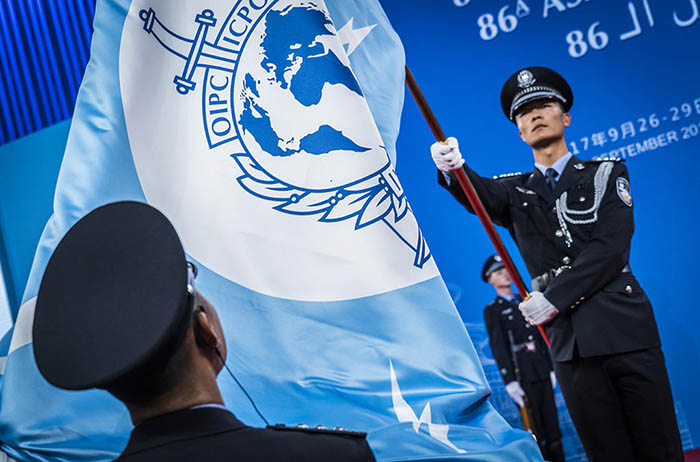
Interpol 86th general assembly (Credit: Interpol)
Red notices have become a tool of political abuse by oppressive regimes. Since August, at least six journalists have been targeted across Europe by international arrest warrants issued by Turkey, Azerbaijan, Uzbekistan and Kazakhstan.
“The use of the Interpol system to target journalists is a serious breach of media freedom. Interpol’s own constitution bars it from interventions that are political in nature. In all of these cases, the accusations against the journalists are politically motivated,” Hannah Machlin, project manager for Index on Censorship’s Mapping Media Freedom, said.
In the most recent case on 21 October, journalist and blogger Zhanara Akhmet from Kazakhstan was detained in Ukraine on an Interpol warrant and is currently in a temporary detention facility. Akhmet claims this red notice is politically motivated.
The journalist worked for an opposition newspaper, the Tribune, in Kazakhstan as well as documented human rights violations by the Kazakh authorities on a blog.
On 14 October, also in Ukraine, Azerbaijani opposition journalist Fikret Huseynli was detained at Kyiv Boryspil Airport.
Huseynli sought refuge in the Netherlands in 2006 and was granted citizenship two years ago. While leaving Ukraine, the journalist was stopped by Interpol police with a red notice issued at the request of the Azerbaijani authorities. He has been charged with fraud and illegal border crossing.
Because Huseynli holds a Dutch passport, he cannot be forcibly extradited to Azerbaijan, but he told colleagues he fears attempts to abduct him.
“The arrest of the Azerbaijani opposition journalist by the Ukrainian authorities at the request of the authoritarian government of Azerbaijan is a serious blow to the common European values such as protection of freedom of expression, which Ukraine has committed itself to respect as part of its membership in the Council of Europe and the OSCE,” IRFS CEO Emin Huseynov said.
On 17 October, Boryspil City District Court ruled to imprison Huseynli for 18 days at a pre-trial detention centre, Huseynli’s lawyer announced.
Huseynli’s arrest was the second time in a month that a journalist has been detained in Ukraine on a red notice.
On 20 September, authorities detained journalist Narzullo Okhunjonov, who had been seeking political asylum in Ukraine, under an Interpol red notice when he arrived from Turkey with his family. Okhunjonov writes from exile for sites including BBC Uzbek on Uzbekistan’s authoritarian government. Uzbekistan filed the international arrest warrant for the journalist on fraud charges. He denies the charges against him.
Five days after he was detained, a Kyiv court sentenced Okhunjonov to a 40-day detention while they decide whether to extradite him to his home country. [/vc_column_text][/vc_column][/vc_row][vc_row][vc_column width=”1/4″][vc_icon icon_fontawesome=”fa fa-times-circle” color=”black” background_style=”rounded” size=”xl” align=”right” link=”url:https%3A%2F%2Fmappingmediafreedom.org%2F%23%2F|||”][/vc_column][vc_column width=”3/4″][vc_column_text]
Since 24 May 2014, Mapping Media Freedom’s team of correspondents have recorded and verified 3,597 violations against journalists and media outlets.
Index campaigns to protect journalists and media freedom. You can help us by submitting reports to Mapping Media Freedom.[/vc_column_text][/vc_column][/vc_row][vc_row][vc_column][vc_column_text]Interpol warrants have also been issued in Spain.
Turkish journalist Doğan Akhanlı was detained while on vacation in Spain on 9 August. The journalist has lived in Cologne since 1992 where he writes about human rights issues, particularly the Armenian Genocide, which Turkey denies.
Turkey charged Akhanlı with armed robbery which supposedly occurred in 1989. After the charges were brought against him in 2010 and he was acquitted in 2011, the Supreme Court of Appeals overturned his acquittal and a re-trial began. Akhanlı faces “life without parole”.
Two weeks later, Interpol removed the warrant and Akhanlı was released. The decision was made after German chancellor Angela Merkel denounced the abuse of the Interpol police agency: “It is not right and I’m very glad that Spain has now released him. We must not misuse international organisations like Interpol for such purposes.”
Markel claimed Erdogan’s use of the international agency for political purposes was “unacceptable”.
Akhanlı’s detention came two weeks after Turkish journalist Hamza Yalçın was detained on 3 August at El Prat airport in Barcelona, where he was vacationing, Cumhuriyet reported. He holds a Swedish passport and has sought asylum there since 1984.
Yalçın is being accused of “insulting the Turkish president” and spreading “terror propaganda” for Odak magazine of which he was the chief columnist, according to a report by Evrensel.
Like Ukraine, Spain’s member state status in the Council of Europe also arises the question of their activity in the arrests of Akhanlı and Yalçın. “The latest cases of arrests of journalists in Ukraine and Spain on the basis of Interpol red notices … have extremely worrying implications for press freedom,” Rebecca Vincent UK Bureau Director for Reporters Without Borders, said. “Interpol reform is long overdue, and is becoming increasingly urgent as critical journalists are now at risk travelling even in Council of Europe member states”.
Turkey’s recent continued persecution of journalists through Interpol also reached as far as Germany. A Turkish prosecutor has requested the Turkish government issue a red notice through Interpol though it is unclear if it went through.
On 28 September 2017, the Diyarbakir Prosecutor’s Office filed an application to seek an Interpol red notice for Can Dündar, the former Editor-in-chief of Turkey’s anti-regime newspaper, Cumhuriyet. The demand for a red notice is based on a speech made by Dündar in April 2016, supposedly supporting the “terror propaganda” of the outlawed Kurdistan Workers’ Party (PKK).
Dündar fled Turkey for Germany in 2016.
On the same day, Peace Research Institute Oslo (PRIO) nominated Dündar and the Cumhuriyet newspaper for the Nobel Peace Prize.
“Turkey is no exception to using this system just as is Russia, Iran, Syria, and its close neighbour and ally Azerbaijan among other governments, where political direction does not necessarily align with democracy, respect for human rights and basic freedoms,” Arzu Geybulla, an Azerbaijani journalist and human rights activist said. “Targeting its citizens who have escaped persecution and have been forced to flee as a result of their opinions, is a worrying sign especially at a time, when over 160 journalists are currently behind bars in Turkey and thousands of people have lost their jobs, been arrested or currently face trials in the aftermath of the July coup.”
Although PACE has adopted a resolution condemning the abuses of Interpol red notices, a review of Interpol’s red notice procedure has yet to be adopted. Amid criticism from human rights activists, journalists, and even leaders like Angela Merkel, it is unclear if Interpol will make a change to their red notice regulations.[/vc_column_text][vc_row_inner][vc_column_inner][/vc_column_inner][/vc_row_inner][/vc_column][/vc_row][vc_row][vc_column][vc_basic_grid post_type=”post” max_items=”4″ element_width=”6″ grid_id=”vc_gid:1509034712367-374920af-c5df-6″ taxonomies=”6564″][/vc_column][/vc_row]
23 Oct 17 | Events
[vc_row][vc_column][vc_single_image image=”96667″ img_size=”full” alignment=”center”][vc_column_text]Risks, Rights and Reputations is led by Index on Censorship in partnership with What Next? and Cause4.
This vital half-day training for CEOs and chairs of trustees supports arts and cultural organisations to handle difficult subjects and sensitive stories to deliver the best work possible.
Navigating the rights and responsibilities of art that explores socially sensitive work can appear daunting, risky and time-consuming; the prospect of controversy, protest, police intervention and possible closure or cancellation because the work is provocative, or the funder is controversial, can be powerful disincentives. And yet great art has always fuelled controversy, and experimentation and risk-taking are integral to achieving excellent, relevant art.
“In recent years there have been an increasing number of high-profile cases raising ethical and censorship issues around plays, exhibitions and other artworks. Censorship – and self-censorship – can stand in the way of great art. That’s why Arts Council England is committed to supporting those organisations who are taking creative risks. It’s important such organisations are aware of relevant legislation and the excellent guidance that exists as well as, crucially, being supported by colleagues across the sector in similar situations. This programme is an important step in ensuring that our sector can continue to create vital, challenging, and risk-taking work.”
— Sir Nick Serota – Chair of Arts Council England
The training will support participants to:
- Deepen understanding of the legal and rights framework supporting artistic freedom in the UK
- Explore the impact on freedom of expression of BME artists of recent controversies in the arts
- Explore the dilemmas thrown up by ethical fundraising
- Support organisations to understand when and how to build a relationship with the police in relation to controversial work
We are delighted that Miriam Randall (Executive Director of Watershed) and James Touzel (Chair of Watershed) will be hosting the session.
Trainers for the afternoon will be:
- Julia Farrington – Freedom of expression specialist from Index on Censorship
- Michelle Wright – Fundraising consultant from Cause4
- Alia Alzougbi – independent trainer facilitator
[/vc_column_text][/vc_column][/vc_row][vc_row][vc_column][vc_column_text]
When: Wednesday 23 May 2018, 12:30–5:30pm
Where: Watershed, 1 Canons Road, Harbourside, Bristol, BS1 5TX
Tickets: £48 – £96 via Eventbrite
[/vc_column_text][/vc_column][/vc_row]
23 Oct 17 | News and features, Volume 46.03 Autumn 2017
[vc_row][vc_column][vc_custom_heading text=”In the autumn 2017 issue of the Index on Censorship magazine, Mark Frary gives his tips on starting your own podcast.”][vc_column_text][/vc_column_text][/vc_column][/vc_row][vc_row][vc_column][vc_column_text]
“You start with the story and the passion to tell the story. Get to know your audience and understand what they want to hear,” said author of book on pocasting Davy Sims when discussing the first step to creating a podcast. You will quickly settle on the format that works best for you and your listeners.
“Interviews are powerful and the simple one-on-one interview show like Marc Maron’s WTF is a key podcast form,” said The Guardian’s Jason Phipps. “If your subject is by default more communal, the round table discussion makes more sense. Saying that, the powerful thing about podcasting, and its advantage over radio, is its capacity to innovate different forms.”
But what about the equipment?
“If you are starting with no experience or knowledge, start cheap and learn. Invest later,” said Sims. For many people this means using the voice recording app on their laptop or smartphone.
If you get bitten by the podcasting bug, you will want a proper digital recorder, such as the Tascam DR-100MKII or the Edirol Roland R-05HR, a good microphone, a Shure SM58 or Rode Podcaster, and headphones.
Editing what you have recorded is an essential skill to learn. Audacity is a free audio editor with a great community of users willing to help newbies, while Apple users have GarageBand. Adobe Audition is for those who want to take podcasting to a more professional level.
“Aim for a consistent time and probably think in 20 minute segments. Listeners can put down an episode when the dog is walked or the bus has stopped and pick up again next time,” advises Sims. “Once a week is good. Perhaps have an occasional update between episodes if there is something worth saying.”
Once you have your beautifully recorded and edited podcast, it needs to be hosted somewhere and there are a number of platforms, including Blubrry, Libsyn, Podbean and Soundcloud. If your podcast is popular you will want to host it on one of these rather than your own site; they also offer detailed listener statistics which could help you get sponsorship. Note that access to Soundcloud is restricted in China.
Then, once it’s out, reach as many people as possible by registering it in directories such as Apple Podcasts, using your own social media, message boards and mailing lists, and developing alliances with other relevant podcasts.
[/vc_column_text][/vc_column][/vc_row][vc_row][vc_column][vc_column_text]
Mark Frary is a regular contributor to The Times and Sunday Times. His latest book on cryptology, Codes, is due out later this year
[/vc_column_text][/vc_column][/vc_row][vc_row content_placement=”top”][vc_column width=”1/3″][vc_custom_heading text=”Free to air” font_container=”tag:p|font_size:24|text_align:left” link=”url:%20https%3A%2F%2Fwww.indexoncensorship.org%2Fnewsite02may%2F2017%2F09%2Ffree-to-air%2F|||”][vc_column_text]Through a range of in-depth reporting, interviews and illustrations, the autumn 2017 issue of Index on Censorship magazine explores how radio has been reborn and is innovating ways to deliver news in war zones, developing countries and online
With: Ismail Einashe, Peter Bazalgette, Wana Udobang[/vc_column_text][/vc_column][vc_column width=”1/3″][vc_single_image image=”95458″ img_size=”medium” alignment=”center” onclick=”custom_link” link=”https://www.indexoncensorship.org/newsite02may/2017/09/free-to-air/”][/vc_column][vc_column width=”1/3″ css=”.vc_custom_1481888488328{padding-bottom: 50px !important;}”][vc_custom_heading text=”Subscribe” font_container=”tag:p|font_size:24|text_align:left” link=”url:https%3A%2F%2Fwww.indexoncensorship.org%2Fnewsite02may%2Fsubscribe%2F|||”][vc_column_text]In print, online. In your mailbox, on your iPad.
Subscription options from £18 or just £1.49 in the App Store for a digital issue.
Every subscriber helps support Index on Censorship’s projects around the world.
 SUBSCRIBE NOW[/vc_column_text][/vc_column][/vc_row]
SUBSCRIBE NOW[/vc_column_text][/vc_column][/vc_row]
23 Oct 17 | Events
[vc_row][vc_column][vc_single_image image=”96667″ img_size=”full” alignment=”center”][vc_column_text]Risks, Rights and Reputations is led by Index on Censorship in partnership with What Next? and Cause4.
This vital half-day training for CEOs and chairs of trustees supports arts and cultural organisations to handle difficult subjects and sensitive stories to deliver the best work possible.
Navigating the rights and responsibilities of art that explores socially sensitive work can appear daunting, risky and time-consuming; the prospect of controversy, protest, police intervention and possible closure or cancellation because the work is provocative, or the funder is controversial, can be powerful disincentives. And yet great art has always fuelled controversy, and experimentation and risk-taking are integral to achieving excellent, relevant art.
“In recent years there have been an increasing number of high-profile cases raising ethical and censorship issues around plays, exhibitions and other artworks. Censorship – and self-censorship – can stand in the way of great art. That’s why Arts Council England is committed to supporting those organisations who are taking creative risks. It’s important such organisations are aware of relevant legislation and the excellent guidance that exists as well as, crucially, being supported by colleagues across the sector in similar situations. This programme is an important step in ensuring that our sector can continue to create vital, challenging, and risk-taking work.” — Sir Nick Serota – Chair of Arts Council England
The training will support participants to:
- Deepen understanding of the legal and rights framework supporting artistic freedom in the UK
- Explore the impact on freedom of expression of BME artists of recent controversies in the arts
- Explore the dilemmas thrown up by ethical fundraising
- Support organisations to understand when and how to build a relationship with the police in relation to controversial work
We are delighted that Skinder Hundal (CEO of New Art Exchange) and Sukhy Johal, MBE (Chair of New Art Exchange) will be hosting the session and your trainers for the afternoon will be:
Julia Farrington – Freedom of expression specialist from Index on Censorship
Helen Jenkins – Fundraising consultant from Cause4
Diane Morgan – Director Nitrobeat[/vc_column_text][/vc_column][/vc_row][vc_row][vc_column][vc_column_text]
When: Wednesday 20 June 2018, 12:30–5:30pm
Where: New Arts Exchange, 39-41 Gregory Boulevard, Nottingham, NG7 6BE
Tickets: £48 – £96 via Eventbrite
[/vc_column_text][/vc_column][/vc_row]
20 Oct 17 | Artistic Freedom, News and features
[vc_row][vc_column][vc_column_text]
With a paradoxically destructive optimism, satirists, from the age of the Roman poet Juvenal and since, have been driven by an almost childlike conviction that the world can and should do better. And the satirists of today, apostates as they are from the modern religion of political correctness – an orthodoxy that (despite professing to be both) is neither moral nor intellectual – need set their sights no further than their own milieu for the necessary targets.
A little over a year ago, at the close of the 2016 Edinburgh Fringe Festival, I presented the Defining the Norm Awards, an Oscars-styled lampooning of stand-up comedy banality and the predatory entertainment industry which fuels it. My intent was to unveil a satirical blueprint of how the mundane is cynically transferred from open mic to telly screen. And of all the sacred cows I have sought to slaughter in my twenty-year career as a satirist – from modern psychiatry to Islam – the current state of Western comedy was by far the most fanatically defended, if only by its practitioners.
What resulted was a tidal wave of social media whinging, suspicions cast upon my mental well-being, and a blacklisting that continues to this day from live bookers all the way up to the BBC comedy department. (“We can’t use Will Franken,” is the word from staff insiders on those rare occasions when my name is put forward for a project. “Remember, he’s the guy that did those awards.”) One thing, however, that was not in evidence in the wake of my mockery was anything resembling a satirical counter-response from the comedy collective. A point, I felt, had been painfully proven.
Because the disquieting truth in our present age is that those least qualified to understand, let alone appreciate, satire are too often comedians themselves. And to attack those who make false pretence to satire is to simultaneously attack a multitude of unquestioned shibboleths – be it lazy reliance on identity politics, Donald Trump’s presumed unfitness to be president, or even the sanctimonious mourning over Britain’s exit from the European Union.
Yet leaving aside, for example, the sheer repetitiveness and predictability of Nigel Farage and Donald Trump putdowns, what makes such political targets ultimately ineffective as contemporary satirical fodder is simply this: Farage and Trump are funnier than most comedians. Both figures, after all, managed to accomplish, in quick succession, major acts of geopolitical subversion against the status quo. Once in the not-too-distant past, this would have been the objective of comedy.
Though such an observation remains anathema to current entertainment establishment, such is the short-sightedness of effective satirists that rarely do they think ahead in terms of people-pleasing career advancement. Rather, he or she is compelled by an attribute especially repulsive to today’s current crop of entertainers: morality.
For amidst all the speculation amongst comedians as to why I decided to hold those in my field up to ridicule, the simple – and therefore baffling – truth was that I ridiculed them because I believed they needed to be ridiculed. [/vc_column_text][/vc_column][/vc_row][vc_row][vc_column][vc_custom_heading text=”Battle of Ideas 2017″ use_theme_fonts=”yes” link=”url:https%3A%2F%2Fwww.battleofideas.org.uk%2F|||”][vc_separator color=”black”][vc_column_text]A weekend of thought-provoking public debate taking place on 28 and 29 October at the Barbican Centre. Join the main debates or satellite events.[/vc_column_text][vc_row_inner][vc_column_inner width=”1/3″][vc_column_text]Political activism and protest today
Recent years have seen something of a revitalisation of political protests and marches, but just what is protest historically and today?
[/vc_column_text][/vc_column_inner][vc_column_inner width=”1/3″][vc_column_text]Can satire survive the era of fake news?
Will the ‘fake news’ era irreparably damage the satirist’s ability to effect any kind of societal change?[/vc_column_text][/vc_column_inner][vc_column_inner width=”1/3″][vc_column_text]Censorship and identity: Free speech for you but not for me?
Is identity politics the new tool of censorship and, if so, how should we respond?[/vc_column_text][/vc_column_inner][/vc_row_inner][/vc_column][/vc_row]











